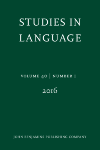
STUDIES IN LANGUAGE
Scope & Guideline
Charting New Territories in Linguistic Studies
Introduction
Aims and Scopes
- Cross-linguistic analysis:
The journal frequently publishes studies that compare linguistic features across different languages, offering insights into universal patterns and language-specific phenomena. - Grammaticalization and its implications:
A core area of focus is the grammaticalization process, exploring how linguistic elements evolve over time and their impact on syntax and semantics. - Morphosyntactic structures:
Research often centers on the morphosyntactic properties of languages, investigating how these structures influence meaning and usage. - Language typology:
The journal emphasizes typological studies that categorize languages based on shared features, contributing to a broader understanding of linguistic diversity. - Empirical linguistic research:
Methodologies include both qualitative and quantitative approaches, with an emphasis on data-driven analysis to support theoretical claims. - Cognitive and psycholinguistic perspectives:
Some articles incorporate cognitive science and psycholinguistics, examining how language is processed and understood in the human mind.
Trending and Emerging
- Evidentiality and modality:
There is a growing interest in the relationship between evidentiality and modality, with multiple papers exploring how these concepts interact within different languages and their implications for understanding meaning. - Language contact and change:
Research on how languages influence one another through contact is becoming more prominent, reflecting contemporary sociolinguistic realities and the dynamics of language change. - Cognitive linguistics:
An increasing number of studies are adopting cognitive linguistic frameworks, emphasizing how cognitive processes shape linguistic structures and usage. - Complexity in linguistic systems:
Emerging themes include the exploration of complexity indices in linguistic typology, as researchers seek to quantify and analyze the intricacies of language systems. - The intersection of syntax and semantics:
A trend towards integrating syntactic and semantic analyses is evident, reflecting a broader understanding of their interdependence in language structure.
Declining or Waning
- Traditional syntax-focused research:
There has been a noticeable shift away from purely syntactic analyses towards more integrated approaches that consider semantics and discourse, indicating a decline in isolated syntactic studies. - Historical linguistics:
Though historical linguistics remains relevant, recent issues show fewer papers dedicated to diachronic studies, suggesting a waning interest in exploring language evolution through a historical lens. - Phonological studies:
Phonology seems to be less featured compared to morphosyntax and semantic studies, reflecting a possible shift in the journal's focus towards areas with broader applicability in language typology. - Descriptive linguistics of lesser-known languages:
While still valuable, the number of descriptive studies on lesser-known languages has decreased, indicating a potential move towards more theoretical explorations rather than purely descriptive ones.
Similar Journals

Mandenkan-Bulletin Semestriel d Etudes Linguistiques Mande
Illuminating the Richness of Mande Linguistic HeritageMandenkan-Bulletin Semestriel d'Etudes Linguistiques Mande is an esteemed academic journal dedicated to the exploration of Mande languages and linguistics, published by the Centre National de Recherche Scientifique in France. With its ISSN 0752-5443, this journal has established itself within the linguistic community, holding a notable Q3 ranking in both the Linguistics and Language category as well as respectable standings in Scopus ranks, placing it in the 55th percentile for language and linguistics. Since its inception in 2018, it has been pivotal in publishing groundbreaking research that advances our understanding of the Mande language family and its cultural implications. Although currently not open access, the journal offers a wealth of knowledge fostered through rigorous peer-reviewed articles aimed at linguists, researchers, and students alike, making significant contributions to the fields of linguistics and African studies.
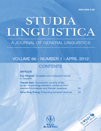
STUDIA LINGUISTICA
Fostering Innovative Discourse in Linguistic ResearchSTUDIA LINGUISTICA is a prestigious journal published by Wiley, focusing on the dynamic and multifaceted fields of Linguistics and Language. With an ISSN of 0039-3193 and an E-ISSN of 1467-9582, the journal has been a vital resource for academics since its inception in 1947, diligently converging insights from history and philosophy of science alongside contemporary linguistic research. Demonstrating excellent scholarly impact, STUDIA LINGUISTICA proudly holds a Q1 ranking in Linguistics and Language as well as a Q2 in History and Philosophy of Science as of 2023, indicating its significance within these academic domains. Furthermore, it ranks in the top percentiles among similar journals, with a commendable 73rd percentile in Language and Linguistics and 70th in related social sciences. Although it does not offer Open Access, its contribution to the discourse of language studies is underpinned by rigorous peer-review processes and commitment to advancing theoretical and empirical research. For researchers, professionals, and students alike, STUDIA LINGUISTICA remains an essential platform for disseminating impactful linguistic scholarship worldwide.
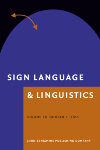
Sign Language & Linguistics
Fostering Scholarly Dialogue in Sign LinguisticsSign Language & Linguistics is an esteemed academic journal published by John Benjamins Publishing Co, dedicated to advancing the field of sign language studies and linguistics. With an ISSN of 1387-9316 and an E-ISSN of 1569-996X, this journal has earned a prominent place in the linguistic community, achieving a Q1 ranking in both the Linguistics and Language category, and standing out within the Scopus rankings, placing in the 77th percentile among the Arts and Humanities and 75th percentile in the Social Sciences categories. Sign Language & Linguistics spans over two decades of research, offering comprehensive insights and analyses from 1998 to 2024, promoting high-quality scholarly communication. Aimed at researchers, professionals, and students alike, this journal is essential for those exploring the intersection of sign languages, linguistics, and cultural studies, facilitating progressive discourse and fostering an understanding of this vital mode of human communication.
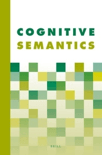
Cognitive Semantics
Navigating the Complexities of Meaning and CognitionCognitive Semantics, published by BRILL, is a leading academic journal dedicated to the intricate study of cognitive processes underlying language use and semantic meaning. With its ISSN 2352-6408 and E-ISSN 2352-6416, this journal contributes significantly to the fields of linguistics and language studies, reflecting its importance in contemporary research on cognitive linguistics. Over its publication span from 2015 to 2024, it has established a niche as a Q3 ranked journal in the Linguistics and Language category for 2023, showcasing its relevance and growing influence in the academic community. Although currently not open access, the journal aims to provide a robust platform for exchanging ideas, theories, and methodologies related to cognitive semantics, fostering interdisciplinary dialogue among researchers, professionals, and students. Readers can expect to uncover valuable insights into the cognitive mechanisms that shape our understanding of language, making this journal an essential resource for anyone involved in linguistic research.

NATURAL LANGUAGE & LINGUISTIC THEORY
Transforming Theoretical Frameworks in LinguisticsNATURAL LANGUAGE & LINGUISTIC THEORY, published by Springer, stands as a premier journal in the field of linguistics, characterized by its rigorous examination of theoretical frameworks and current research trends within natural language. With the ISSN 0167-806X and E-ISSN 1573-0859, this journal has maintained a stellar reputation since its inception in 1983, consistently ranked in the Q1 category for Linguistics and Language as of 2023. Its impressive standing in Scopus ranks (#127 in Arts and Humanities and #143 in Social Sciences) further underscores its influence, occupying the 88th and 87th percentiles respectively. Although the journal does not provide Open Access options, it remains a vital resource for scholars and practitioners seeking to deepen their understanding of the nuances of linguistic theory. The journal's scope encompasses a wide array of topics relevant to both theoretical analysis and practical applications in linguistics, making it essential reading for anyone engaged in the study of language sciences.

SKASE Journal of Theoretical Linguistics
Fostering Collaboration in Theoretical LinguisticsSKASE Journal of Theoretical Linguistics, published by the SLOVAK ASSOCIATION STUDY ENGLISH-SKASE, is a distinguished Open Access journal that expands the horizons of linguistic research and theoretical frameworks. With its ISSN N/A and E-ISSN 1336-782X, the journal has established itself as a pivotal resource for scholars in the field, achieving a commendable Q2 ranking in Linguistics and Language as of 2023. The journal, which has been in continuous publication since 2017, actively publishes innovative research studies, reviews, and theoretical discussions, easing access to groundbreaking work for academics and practitioners alike. Based in Slovakia, it connects a rich heritage of linguistic scholarship and is indexed in Scopus, ranking alongside its peers in both Arts and Humanities and Social Sciences categories. The SKASE Journal of Theoretical Linguistics is crucial for anyone interested in the evolving landscapes of linguistics, serving as an invaluable platform for disseminating knowledge and fostering collaboration amongst researchers worldwide.
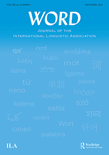
WORD-JOURNAL OF THE INTERNATIONAL LINGUISTIC ASSOCIATION
Uncovering insights that shape the future of linguistics.WORD-JOURNAL OF THE INTERNATIONAL LINGUISTIC ASSOCIATION is a leading peer-reviewed journal dedicated to advancing the field of linguistics and language studies. Published by Routledge Journals, Taylor & Francis Ltd, this esteemed journal has earned a reputation for its rigorous scholarship, reflected in its 2023 Q2 ranking in Linguistics and Language and its solid performance in Scopus Ranks. Encompassing a wide range of topics—from theoretical frameworks to empirical research—WORD serves as an essential resource for linguistics researchers, educators, and students alike. While currently not operating under an open access model, the journal is committed to providing high-quality, impactful research articles that contribute significantly to the linguistic community. With its convergence periods from 1998 to 2009 and 2015 to 2024, WORD continuously fosters the discourse of language studies, ensuring that critical insights and discussions are accessible for ongoing academic exploration.

Cadernos de Estudos Linguisticos
Unveiling the intricacies of language studies since 1978.Cadernos de Estudos Linguisticos, published by UNIV ESTADUAL CAMPINAS, INST ESTUDOS LINGUAGEM, stands as a pivotal platform in the field of linguistic studies since its inception in 1978. With its commitment to Open Access, this journal fosters the dissemination of cutting-edge research, ensuring that knowledge is accessible to a global audience. This also enhances collaboration among researchers, professionals, and students dedicated to exploring the nuances of language. The journal proudly carries the ISSN 0102-5767 and E-ISSN 2447-0686, attesting to its uninterrupted quality and relevance in linguistic scholarship. By addressing various facets of language studies, including syntax, semantics, and sociolinguistics, this esteemed journal is a vital resource for advancing understanding and innovation in the field.

Lingue e Linguaggio
Connecting Scholars in the Realm of Language and LinguisticsLingue e Linguaggio, published by SOC ED IL MULINO, is a distinguished academic journal in the field of Linguistics and Language, hailing from Bologna, Italy. With an esteemed Q2 ranking in its category as of 2023, this journal is recognized for its contributions to both the arts and humanities as well as social sciences, achieving notable positions within Scopus rankings. It serves as a vital platform for researchers, practitioners, and students interested in exploring various linguistic phenomena, language dynamics, and theoretical frameworks. Although it operates under a traditional subscription model rather than open access, its comprehensive array of studies and publications provides significant insights and fosters academic discourse. With a publication period extending from 2002 to 2024, Lingue e Linguaggio continues to be a key resource for advancing the understanding of language in contemporary contexts.
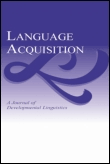
Language Acquisition
Pioneering research at the intersection of linguistics and psychology.Language Acquisition, published by ROUTLEDGE JOURNALS, TAYLOR & FRANCIS LTD, is a leading academic journal dedicated to the interdisciplinary study of language development and acquisition. With an ISSN of 1048-9223 and E-ISSN 1532-7817, this peer-reviewed journal caters to professionals, researchers, and graduate students in the fields of linguistics and educational psychology. The journal boasts an impressive 2023 Scopus ranking of Q1 in Linguistics and Language and Q2 in Education, reflecting its high impact and relevance within academic circles. Notably, it is indexed among the top 15% of journals in Language and Linguistics, showcasing its significance in contributing knowledge to these vibrant fields. Although currently not open access, Language Acquisition makes a profound impact on understanding how individuals acquire language, facilitating discussions on pedagogical strategies, cognitive development, and sociolinguistic factors. The journal's historical and ongoing contributions since its inception in 1990 reinforce its position as a vital resource for advancing research and theory related to language acquisition.